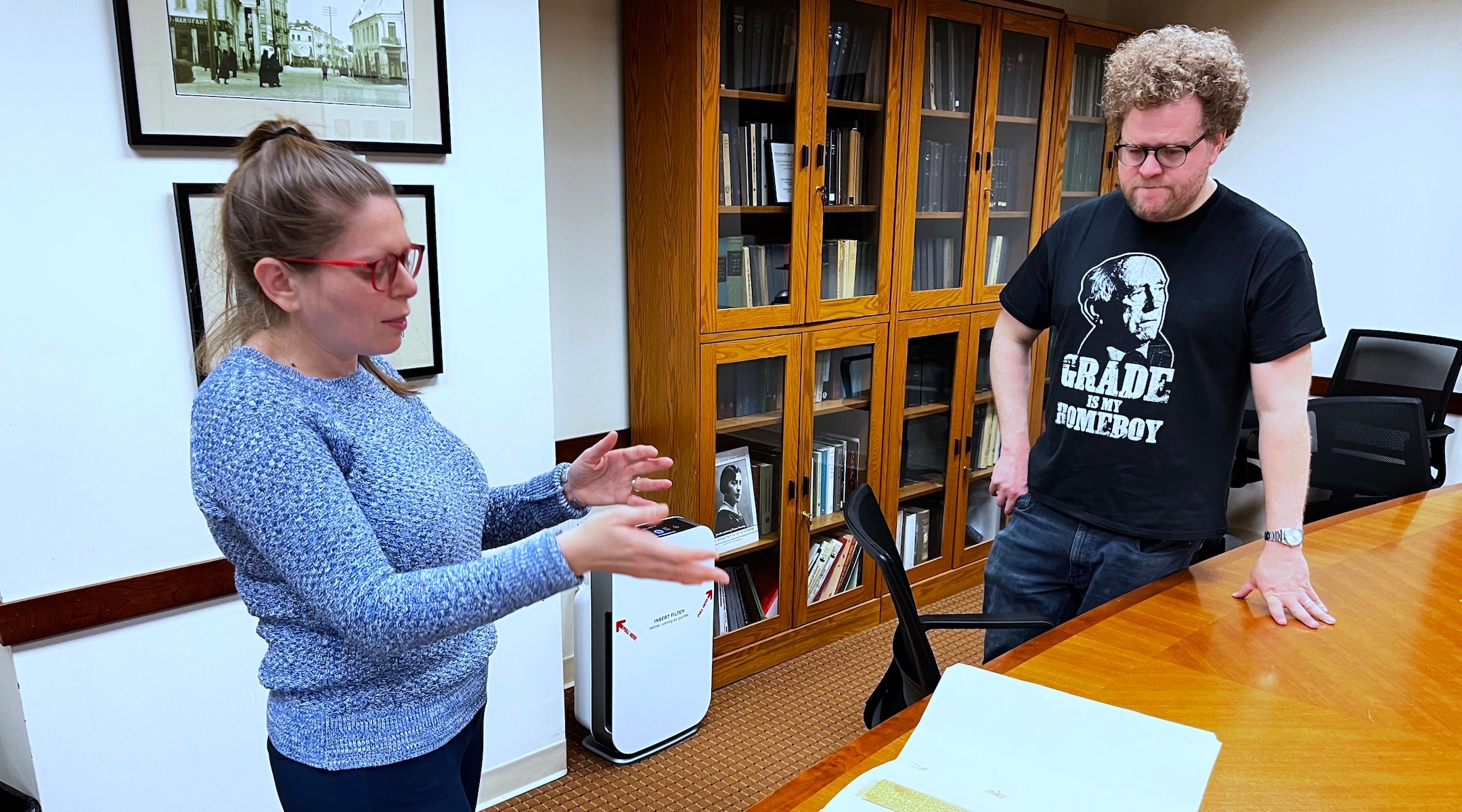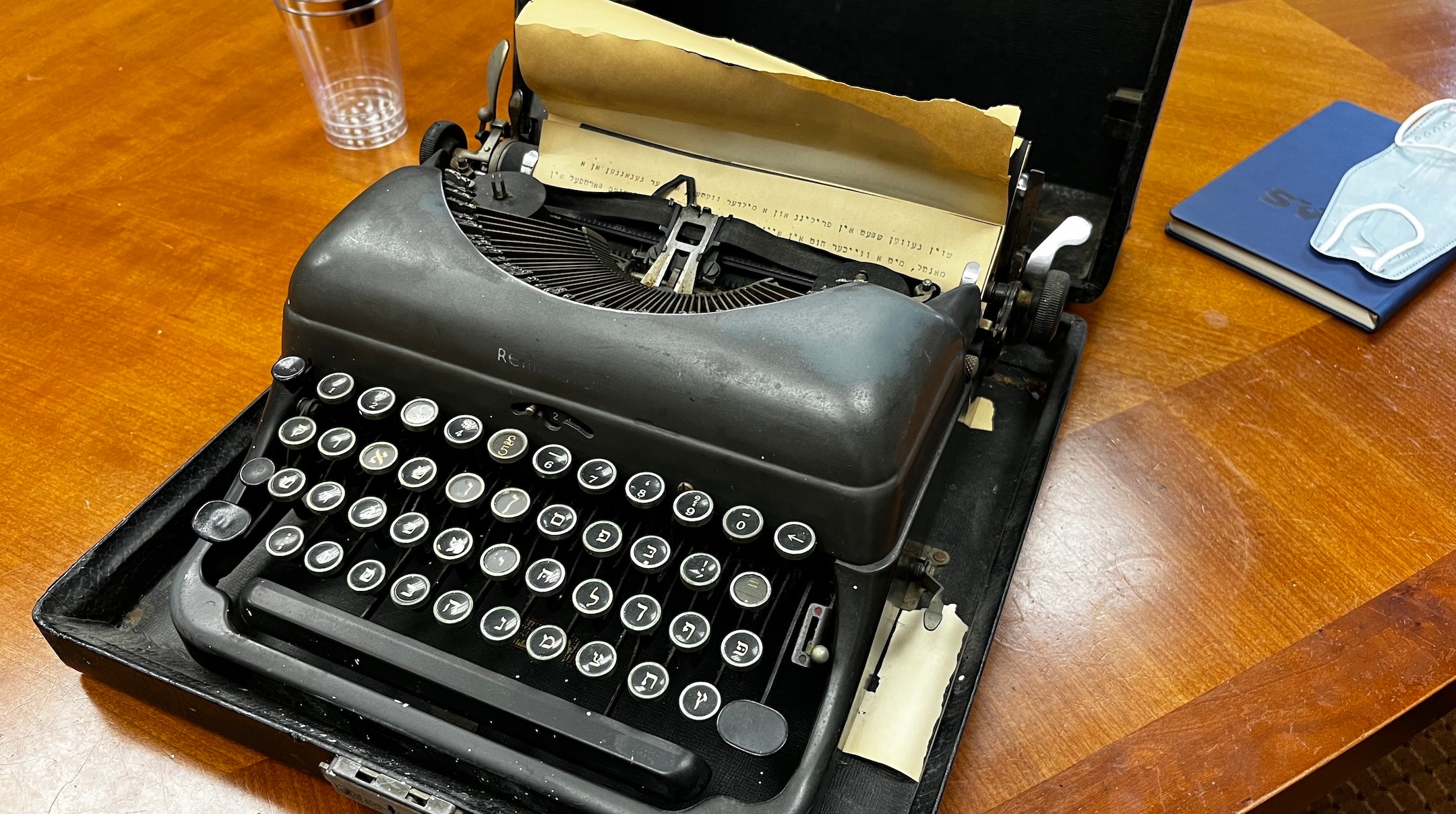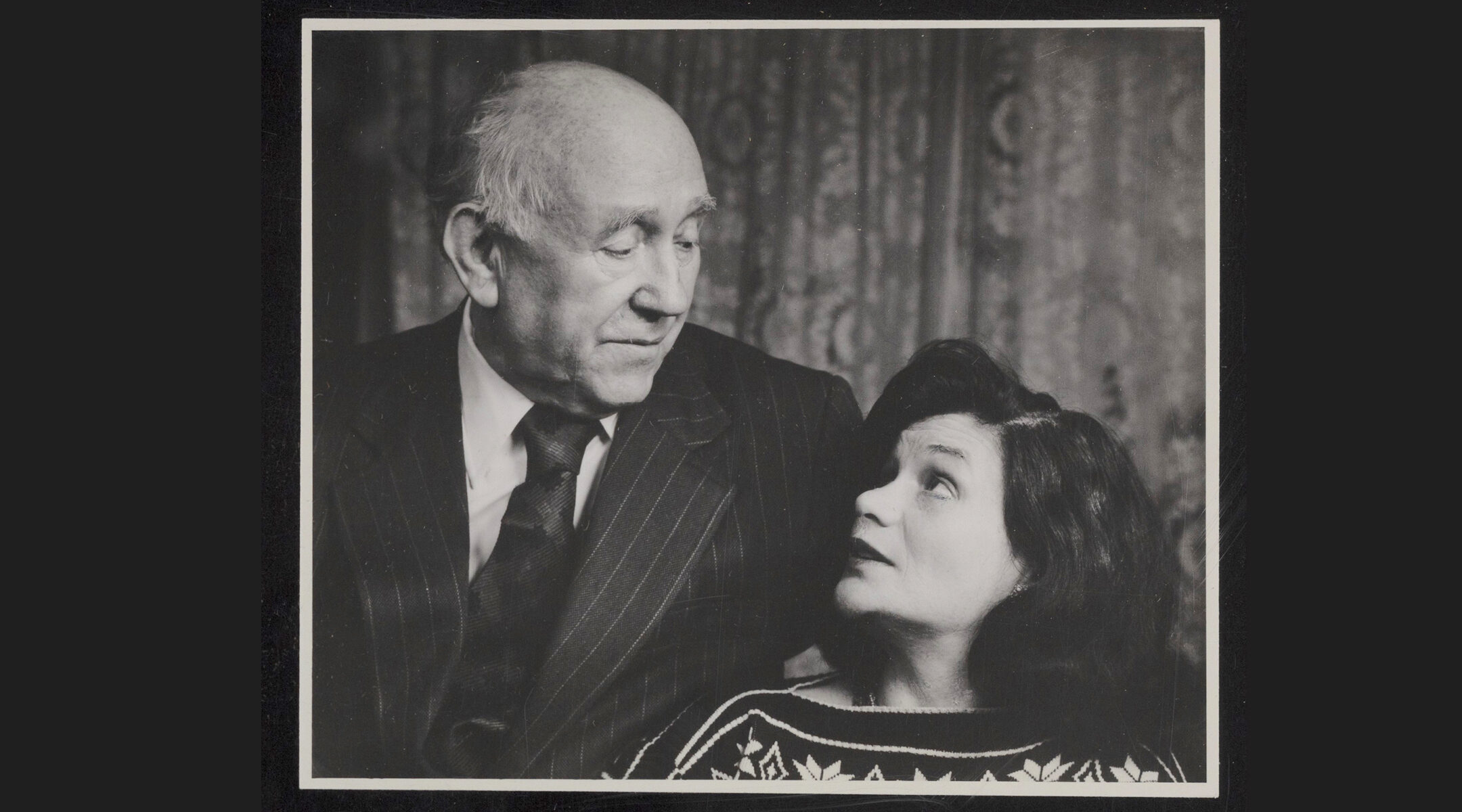(JTA) — Years ago, when I worked at the Forward, I had a cameo in a real-life Yiddish drama.
A cub reporter named Max Gross sat just outside my office, where he answered the phones. A frequent caller was Inna Grade, the widow of the Yiddish writer Chaim Grade and a fierce guardian of his literary legacy. Mrs. Grade would badger poor Max in dozens of phone calls, especially when a Forward story referred kindly to the Nobel laureate Isaac Bashevis Singer. Grade’s widow described Singer as a “blasphemous buffoon” whose fame and reputation, she was convinced, came at the expense of her husband’s.
As Max explains in his 2008 memoir, “From Schlub to Stud,” Mrs. Grade “became a bit of a joke around the paper.” And yet in Yiddish literary circles, her protectiveness of one of the 20th century’s most important Yiddish writers was serious business: Because Inna Grade kept such a tight hold on her late husband’s papers — Chaim Grade (pronounced “Grah-deh”) died in 1982 — a generation of scholars was thwarted in taking his true measure.
Inna Grade died in 2010, leaving no signed will or survivors, and the contents of her cluttered Bronx apartment became the property of the borough’s public administrator. In 2013, Chaim Grade’s personal papers, 20,000-volume library, literary manuscripts and publication rights were awarded to the YIVO Institute for Jewish Research and the National Library of Israel. They are now stored in YIVO headquarters on Manhattan’s W. 16th Street.
This week YIVO and the NLI will announce the completion of the digitization of “The Papers of Chaim Grade and Inna Hecker Grade,” making the entire archive publicly accessible online. When the folks at YIVO invited me to come and look at the Grade collection, I knew I had to invite Max, not just because of his connection to Inna Grade but because he has become a critically acclaimed novelist in his own right: His 2020 novel “The Lost Shtetl,” which imagines a Jewish village in Poland that has somehow escaped the Holocaust, is in many ways an homage to the Yiddish literary tradition.
We met on Thursday with the YIVO staff, who were tickled by the T-shirt Max was wearing, which had a picture of Chaim Grade and the phrase “Grade is my homeboy.” (Max said his wife bought it for him, although neither could imagine the market for such a shirt.)

Stefanie Halpern, director of the YIVO archives, and novelist Max Gross discuss a thick file containing news clippings relating to the late Yiddish novelist Chaim Grade at YIVO’s Manhattan offices, Feb. 2, 2023. (New York Jewish Week)
The Grade papers — manuscripts, photographs, correspondence, lectures, speeches, essays — are stored in folders in gray boxes, whose neatness belies the years of effort that went into putting them in order. Jonathan Brent, executive director and CEO of YIVO, described for us the Grades’ apartment, which he visited shortly after Inna’s death.
“It was like a combination of my grandmother’s apartment and a writer’s home,” he said. “Everything was books, books to the ceiling. You open a drawer in the kitchen where you think there’ll be knives and forks, there are books, there are manuscripts. You open the cabinet in the bathroom, there are more manuscripts and books and books…. But the thing I remember most is that at the top of a shelf there was that much dust.” He held his fingers about two inches apart.
Inna Grade was Chaim Grade’s second wife. The writer was born in Vilna (now in Lithuania) in 1910. He was able to flee east during the Nazi occupation, leaving behind his mother and his first wife under the assumption that the Germans would only target adult men. It was a tragic miscalculation, and their deaths would haunt Grade the rest of his life. Inna Hecker was born in Ukraine in 1925, and met Grade in Moscow during the war. Married in 1945, they immigrated to the United States in 1948.
Chaim Grade had already established a reputation as a poet, playwright and prose stylist before the war; English translations of his novels “The Agunah” and “The Yeshiva” and serial publication of his novels in the Yiddish press brought him recognition in America for what the Yiddish scholar Ruth Wisse calls a “Dostoyevskian talent to animate in fiction the destroyed Talmudic civilization of Europe.” Columbia University professor Jeremy Dauber, in a YIVO release, says that Grade was possessed “by the spirit of the yeshiva world he’d left behind; then possessed by the spirits and memories of those who’d been murdered by the Nazis.”
Stefanie Halpern, director of the YIVO archives, showed us the physical evidence of that possession: Grade’s notebooks, in which he wrote down ideas and inspiration in a careful Yiddish script; manuscripts for at least two unpublished dramatic works, “The Dead Can’t Rise Up” and “Hurban” (“Destruction”); a photograph of Grade standing amidst the ruins of Vilna during his only visit after the war; pictures of the Bronx apartment taken when the couple was still alive, book-filled but still tidy.
Halpern also showed us the Yiddish typewriter recovered from the apartment, with what is believed to be the last page he worked on still rolled in its platen.

Chaim Grade’s typewriter, preserved in the condition it was found when the Yiddish author died in 1982, contains what are apparently the last lines he ever wrote. (New York Jewish Week)
The archivists are also careful to give Inna her due. After arriving in America she studied literature and received a master’s degree from Columbia, and often translated her husband’s work. Thanks to her, hundreds of clippings of Grade’s work and articles about him have survived.
Her correspondence reflects the lengths she went to protect her husband’s legacy during and after his lifetime, including a bizarre and lengthy letter to the Vatican complaining about Singer. “She was a brilliant and creative person, devoted in a way only a widow can be,” said Brent. “And perhaps devoted to a maddening extent.”
If all that sounds like the stuff of Jewish fiction, it is: In 1969, Cynthia Ozick wrote a novella called “Envy; or, Yiddish in America,” about Yiddish writers very much like Grade consumed with envy for a writer very much like Singer. “They hated him for the amazing thing that had happened to him — his fame — but this they never referred to,” wrote Ozick. “Instead they discussed his style: his Yiddish was impure, his sentences lacked grace and sweep, his paragraph transitions were amateur, vile.”
Halpern showed us a mailgram from Inna to the Forward that makes it clear that she and her husband read and hated the story. In it she describes Ozick as “no less grotesque than evil.”
For all of the gothic Yiddish aspects of its retrieval, “this is probably the single most important literary acquisition in YIVO’s postwar history,” Brent said of the archive. He described publishing projects already underway with Schocken Books and other publishers that will draw on the material.
Max and I discussed what it felt like to see what had become “a bit of a joke” around the Forward office placed at the center of an epic exercise in literary preservation. Max was struck by the way Inna’s personality came through in the papers. “This was her,” he said. “Her obsession, her struggle, all these things. It was definitely remarkable to see that.”
I recalled overhearing his conversations with Inna, and how her behavior could seem funny and exasperating, but also admirable and more than a little sad — in that her devotion to her husband’s reputation may also have prevented scholars from doing the work that would have made him better known.
“Exactly, but that’s one of the reasons why you get into Yiddish literature, because all of these things are true at the same time,” said Max. “Those kinds of scores, rivalries, feuds within Yiddish literature is what is so great about it. It is great to see that somebody really cared and that literature was taken so seriously. And the pettiness was something you couldn’t quite divest from the rest of it.”
JTA has documented Jewish history in real-time for over a century. Keep our journalism strong by joining us in supporting independent, award-winning reporting.







